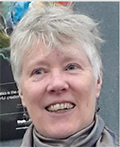Margaret H. Dean

Professor
Mathematics
EMAIL: mdean@bmcc.cuny.edu
Office: N-599Q
Office Hours: Spring 2013: M 12:30-2:30 pm, Th 12-1 pm
Phone: +1 (212) 220-1367
Ph.D. in Mathematics, CUNY Graduate Center
Expertise
Group Theory
Degrees
- Ph.D. The CUNY Graduate Center, Mathematics,
- B.S. The City College of New York, CUNY, Mathematics,1976
- M.S. Courant Institute, New York University, Mathematics,1978
Courses Taught
- This course is the first algebra course offered at the College. It includes such topics as algebraic representation, signed numbers, operations with polynomials, factoring, the solution of linear equations, the coordinate system, the solution of simultaneous linear equations of two variables, and graphing. This course is designed to prepare students for the CUNY Freshman Skills Assessment Test required for transfer to the upper division of CUNY, as well as for more advanced math courses. If a student passes MAT 12, the student should not register for MAT 51, since MAT 12 combines MAT 8 and MAT 51.
Students who passed MAT 12, MAT 14, MAT 41, MAT 51, MAT 56, MAT 160, MAT 161, MAT 56.5, MAT 150.5 cannot take MAT 161.5.
Course Syllabus - This course is the second algebra course offered at the college. It is open to students who have completed elementary algebra or its equivalent. It includes such topics as: factoring, solutions of linear and quadratic equations, trigonometric relationships, exponents, logarithms, and the graphs of quadratic equations.
Students who passed MAT 12, MAT 14, MAT 41, MAT 51, MAT 56, MAT 160, MAT 161, MAT 56.5, MAT 150.5 cannot take MAT 161.5.
Course Syllabus - This course covers computations and measurements essential in the health science professional fields with an emphasis on nursing. Topics include units and systems of measurement, reconstitution of powdered medications, oral and parenteral dosage calculations, adult and pediatric dosage calculations based on body weight, intravenous calculations, and pediatric medication calculations. Students who passed MAT 104.5 cannot take MAT 104 course. Students who passed MAT 104 course cannot take MAT 104.5 course.
Prerequisites: MAT 12, MAT 14, MAT 41, MAT 51 or MAT 161.5
Course Syllabus - This course covers basic statistics, including: measures of central tendency, measures of dispersion, graphs, correlation, the regression line, confidence intervals, the significance of differences, and hypothesis testing, including z-tests, t-tests, and chi-square tests.
Prerequisites: MAT 12, MAT 14, MAT 41, MAT 51 or MAT 161.5
Course Syllabus - This course covers fundamental mathematical topics associated with computer information systems, including: numeration systems; sets and logic; Boolean algebra, functions, and elementary switching theory; combinatorics; mathematical induction; permutations; combinations; binomial coefficients; and distributions.
Prerequisite: MAT 12 or MAT 51; and MAT 56 or MAT 56.5 or MAT 206.5.
Course Syllabus - This course covers basic algebraic and trigonometric skills, algebraic equations, and functions. Topics include: mathematical induction, complex numbers, and the binomial theorem.
Prerequisite: MAT 56 or MAT 56.5
Course Syllabus - This is an integrated course in analytic geometry and calculus, applied to functions of a single variable. It covers a study of rectangular coordinates in the plane, equations of conic sections, functions, limits, continuity, related rates, differentiation of algebraic and transcendental functions, Rolle's Theorem, the Mean Value Theorem, maxima and minima, and integration.
Prerequisite: MAT 206 or MAT 206.5
Course Syllabus - This course is an extension of the concepts of differentiation and integration to functions of two or more variables. Topics include partial differentiation, multiple integration, Taylor series, polar coordinates and the calculus of vectors in one or two dimensions.
Prerequisite: MAT 302
Course Syllabus - This course covers matrices, determinants, systems of linear equations, vector spaces, eigenvalues and eigenvectors, Boolean algebra, switching circuits, Boolean functions, minimal forms, Karnaugh maps.
Prerequisite: MAT 302, or permission of the department
Course Syllabus - This is a first course in the theoretical and applied aspects of ordinary differential equations. Topics include: first-order equations, exact equations, linear equations, series solutions, Laplace transforms, Fourier series, and boundary value problems.
Prerequisite: MAT 302
Course Syllabus - The course follows the growth of mathematics from its empirical nature in Egypt and Babylonia to its deductive character in ancient Greece wherein the roots of the calculus will be identified. The concept of number and the development of algebra, with Hindu, Arabic, and medieval contributions are discussed. The rise of analytic geometry, the calculus, and the function concept are examined. Finally, the trend towards greater rigor and abstraction is considered including formal axiomatic systems and Godel's Incompleteness Theorem.
Prerequisite: MAT 302
Course Syllabus - This course includes the study of several mathematical systems. The role of mathematics in modern culture, the role of postulational thinking in all of mathematics, and the scientific method are discussed. The course considers topics such as: the nature of axioms, truth and validity; the concept of number; the concept of set; scales of notation; and groups and fields.
Prerequisites: MAT 12, MAT 14, MAT 41, MAT 51 or MAT 161.5
Course Syllabus
Research and Projects
Publications
- Metabelian Product of a Free Nilpotent Group with a Free Abelian Group,Groups-Complexity-Cryptology, V 1, No. 2, 169-180
- Wreath products and subgroups of division rings,Journal of Algebra, 299, 725-730
- “IA-automorphisms of Groups with Almost Constant Upper Central Series,” with Bonanome, M. and Zyman, M.,Computational and Combinatorial Group Theory and Cryptography, B. Fine, D. Kahrobaei, G. Rosenberger, eds., American Mathematical Society, Contemporary Mat
- “Adjunction of Roots in Exponential A Groups,” with Majewicz, S and Zyman, M.,Computational and Combinatorial Group Theory and Cryptography, B. Fine, D. Kahrobaei, G. Rosenberger, eds., American Mathematical Society, Contemporary Mat
- Lectures on finitely generated solvable groups, with Bencsath, K.A., Bonanome, M.C., and Zyman, M.,Springer, SpringerBriefs Series

